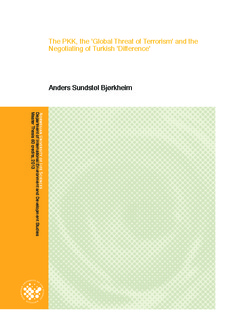The PKK, the 'Global Threat of Terrorism' and the negotiating of Turkish 'Difference'
Abstract
Along with the proliferation of terrorism studies that followed the September 11 attacks,
many critical theoretical perspectives have followed. But few studies have combined
insight into the delegitimizing aspects of the ‘terrorist’ label with its constitutive role for
Self-identity, and even fewer have looked at the possibility of states negotiating their
identity vis-à-vis larger collectives by representing ‘terrorism’ as a shared threat. Through
employing discourse analysis, this thesis analyzes representations of ‘terrorism’ and
‘terrorist’ by Turkish politicians and diplomats in the United Nations between 2001 and
2012, and by Turkish military officers in the NATO Centre of Excellence: Defence Against
Terrorism between 2006 and 2011. It asks how the conflict with the Kurdistan Workers’
Party (PKK) is represented as part of an international fight against terrorism, how these
representations position the PKK, and how they contribute to the negotiation of Turkish
‘difference’ vis-à-vis ‘Europe’ and ‘the West’. It finds that both the politicians, diplomats
and military officers represent ‘terrorism’ as a homogeneous and ubiquitous phenomenon
which there is an international obligation to fight together, rejecting distinctions between
‘terrorists’ and tying in the PKK trough references to Turkey’s own ‘sufferings’. The
‘terrorist’ identity is constructed through various representations that put it in a position of
fundamental illegitimacy – as homo sacer. Together, these serve as a constitutive Other for
the negotiation of ‘difference’. In the first years of analysis, ‘terrorism’ and ‘terrorist’ are
represented as threatening ‘civilization’, a rhetorical commonplace with links to European
discourses of Otherness, with which both the Ottoman Empire and Turkey have struggled.
After the coming to power of the Justice and Development Party (AKP), ‘civilization’
becomes pluralized, cultural diversity is emphasized as a positive, and ‘humanity’ takes
over as what ‘terrorism’ is mainly represented as threatening. Though representations of
Self-identity are less consistent amongst the military officers, there are several examples
of negotiating ‘difference’ similar to the politicians and diplomats, including the
invocation of ‘common values’ articulated to (e.g.) ‘human rights’ and ‘freedom of
speech’; rhetorical commonplaces used in designations of Turkish Otherness even today.
